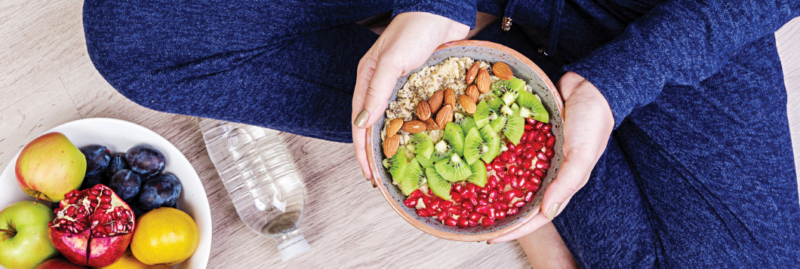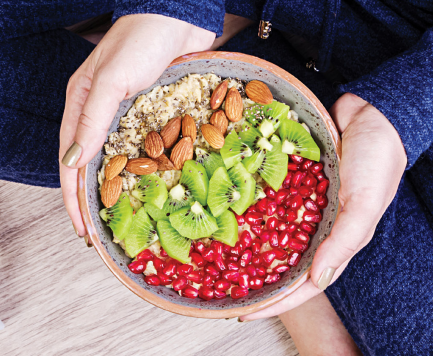Put a Spring in Your Step
Spring is often the time when we take on new projects, like cleaning out the house. But it’s also the perfect time to work on another project: your health. If self-care has fallen by the wayside this winter, following the springtime practices of Ayurveda might be just the thing to help you blossom into a new, healthier you.
Put a spring in your step the ayurveda Way
Derived from the Sanskrit root “Ayu” meaning “life” and “Veda” meaning knowledge, Ayurveda is a philosophy and health science that originated in India more than 3,000 years ago, which promotes life and longevity. It centers around the concept that we are all deeply tied to nature, therefore it can teach us the best ways to go through our daily, weekly, and seasonal routines. Although our modern-day lives may seem wildly detached from nature—with our houses, grocery stores, and electronics—it still influences our lives.
“We, as people, are kind of a representation of the greater environment that we exist in. So you can’t assume that you’re controlling your entire environment because you’re locked in your house,” explained Jen Rand, an Ayurvedic health practitioner from Mount Madonna Institute. If you pay close attention, nature gives us clues on everything from how we should be eating to how we should be exercising.
One of the easiest ways to attune ourselves to nature is to eat with the seasons. In the winter, when it’s cold and the days are short, we tend to want heartier foods like soups and stews to keep us full and warm, much like a bear stocking up for hibernation. As spring thaws us out and we emerge from our hibernation, of sorts, nature greets us with lighter foods to help refresh us and balance out the sweet, sour, and salty foods we’ve been eating all winter.


There is a saying in Ayurveda that “like increases like,” while opposites decrease or balance you out. Eating cold foods in winter will only make you colder, and eating hot foods in summer will only make you hotter. Because spring is still on the chilly side, Rand recommends sticking to warmer foods, like soups and teas, rather than cold drinks and foods to help keep your body balanced. Herbal teas, like ginger tea with lemon or teas with turmeric root, can help keep you feeling warm and refreshed, as well as cleanse your digestion and possibly reduce inflammation.
Maintaining balance applies to more than just temperature, however. “There’s more moisture in the air in spring and that can lead to more congestion and allergies. If you already have a propensity to dampness and congestion in the body, adding more of that will have a cumulative effect,” Rand explained.
She recommends being mindful of what you’re eating and paying attention to how those foods are serving you. If you notice that certain foods like dairy or foods high in sugar make you more congested or tired, it might help to eliminate those things from your diet for a while, something Rand recognizes can be hard to do.
“We have a concept in Ayurveda called ‘crimes against wisdom,’ where there’s something you know you’re not supposed to do but you do it anyway,” she said. It’s a struggle Rand thinks is heavily influenced by stress. Ultimately, it’s up to you to decide how much you mind the side-effects of certain foods, but Rand encourages making choices that bring you a sense of calm so that you aren’t approaching food from a stress-craving standpoint. Eventually you might realize you have more energy or you feel better.
Taking cues from the sun is another way nature guides us. Rand explains that as we get more sunlight and milder temperatures we usually find that we have more energy, so it’s a great time to be more active. Ideally, according to Ayurveda, the best time to exercise is in the morning because it syncs us with the rising sun, jumpstarts our metabolism, and boosts our mood for the rest of the day. Since spring is a time of new growth, it’s a great time to shake up routines by trying new forms of exercise. If you’re always doing the same exercises or going to the same fitness instructor, you become familiar with the same patterns, which can cause you to be less engaged. Stepping out of your comfort zone and experiencing new kinds of exercises helps awaken dormant muscles, freshens your perspective, and can even foster new friendships. If you’re used to exercising indoors, try outdoor activities. If you’re used to weight training, try yoga, which goes hand-in-hand with Ayurvedic principles. Even exercising in a new spot than what you’re accustomed to can help you pay closer attention to what’s going on.
While these general practices are a good start, Rand emphasizes that Ayurveda is a very personalized style of medicine. What is healing for one person could be detrimental to another. The Ayurveda practitioners at the Mount Madonna Institute can provide in-depth coaching in both Ayurveda and yoga to help you improve your health. If you’re interested in a consultation, they can be reached through Ayurveda@MountMadonnaInstitute.org.
Aligning with the pace of nature might seem difficult or odd, but it’s something Rand feels anyone can benefit from, especially if you’re feeling stressed and rundown. “It’s a nice way to slow down and take stock of your life before it’s all rushed past,” she explained. So, this spring, embrace what nature has to offer. You might find a sense of empowerment over your life you didn’t know you could have.







